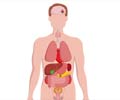
Transcription factors are proteins that bind to specific sequences of DNA to regulate cell functions. Hypoxia-inducible factors (HIFs) are transcription factors that control a wide range of functions connected to the way cells respond to oxygen, including metabolism (the way energy is produced) and the creation of red blood cells. Increased amounts of HIF in cancer cells was found to be responsible for the unique way they generate energy, referred to as the Warburg effect, named for Otto Warburg, a German physiologist who received the 1931 Nobel Prize in Physiology for this research.
"These HIF pathway mutations were first discovered while studying people with a condition called polycythemia that makes the body overproduce red blood cells," said one of the senior authors, Josef Prchal, M.D., professor in the Division of Hematology and Hematologic Malignancies at the University of Utah School of Medicine, an HCI investigator, and an expert on polycythemic disorders who has previously discovered other mutations in other HIF pathway genes.
The findings raise some important questions for future research. "The patients in which we found these mutations have a rare combination of diseases, paraganglioma/pheochromocytoma and polycythemia, yet they shared similar mutations," said Prchal. "Learning whether HIF pathway mutations are present in other cancers could increase understanding of the mechanisms of cancer cell metabolism and offer a possible new target for cancer treatment development."
Source-Eurekalert















